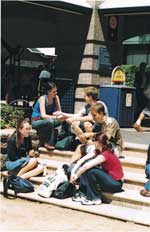|
||||||||||||||||||||||||||
| Americas Studies - AMSTA23403 | ||||||||||||||||||||||||||
This plan is only available to students commencing from 2009 onwards
The study of the Western Hemisphere is essential for an understanding of the relationships between regions and nation states in a globalised world. The United States remains the dominant economic, political and cultural nation state in the world today, but other nations of the region, including those of Mesoamerica and South America are growing in importance. Brazil, for example, is counted amongst the BRICs (emerging economic economies - Brazil, Russia, India, China), and is currently pushing to secure a permanent seat on the UN Security Council. Australia’s links with the US are well known, but Australian government and businesses are also increasing their relationship with the Latin American region, in part because of a coincidence of interests in terms of trade, investment, and resource extraction. In 2004 the Australian government established the Council of Australia Latin American Relations (COALAR: www.dfat.gov.au/coalar/), and there is a very active Australia-Latin America Business Council (ALABC: http://www.alabc.com.au). Australia and the Latin American countries are also becoming more closely linked with the Asian economies. Moreover, there are parallels to be drawn between the experiences of the Western Hemisphere and of Australia as both constitute areas of recent settlement. Similarities include the form of economic development, immigration, and the displacement of indigenous populations. Many former and present citizens of the Western Hemisphere also, now, ‘call Australia home’. The program aims to be coherent and is based on progression. Students will be introduced to the area of study in the keystone course in first year, concentrate on particular areas of investigation in second year, and deepen their analysis of linkages in third year. As students progress, they will deepen their analytical skills, develop their research techniques, increase and broaden their knowledge, and become increasingly aware of different theoretical approaches. Specifically, the aims and objectives of Americas Studies are: a) To build the knowledge of students of the political, economic, social and cultural developments that have occurred, and are occurring, in the Western hemisphere. b) To clarify the unique features of the Western Hemisphere and add to students’ awareness of cultural and other diversities. c) To delineate and clarify the links, over time, of the Western Hemisphere with other parts of the world. These links include the political, the economic, the social and the cultural. d) To develop the intellectual, creative and analytical skills of students in the context of interdisciplinarity and transdisciplinarity. This will allow them to integrate a variety of approaches in the formulation of problems, and enable them to project solutions. e) To encourage students to undertake study abroad in the Western Hemisphere. f) To open up employment prospects for students. The program is not oriented towards a specific career but it will give the students the knowledge background, the appreciation of diversity, and the skills and flexibility of thinking, to orient them towards a wide range of employment possibilities including in diplomacy and other government jobs, business, media, teaching, management, marketing, social work, and law. A student who wishes to gain a Minor in Americas Studies must complete 36 units of credit including 6 uoc at Level 1, at least 12 uoc at Level 2 and at least 12 uoc at Level 3.
Level 1
Level 2
Level 2 offers electives covering aspects of colonial and modern Latin American and US history including nineteenth and twentieth century political, economic and social transformations and the dominance of Hollywood in the production of film culture for the world.
Level 3
Level 3 course cover some of the issues raised in Levels 1 and 2 in more depth with special emphasis on the importance and affects of the policies of the United States in world affairs. Other courses concentrate on particular cultural aspects of Latin America and the global reach of the Spanish-speaking world.
|
||||||||||||||||||||||||||



